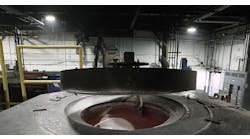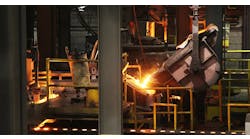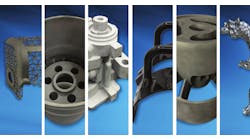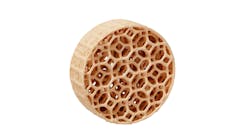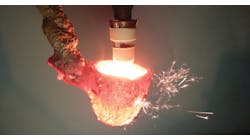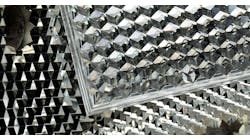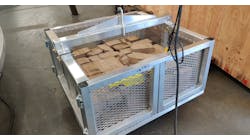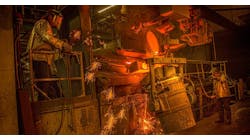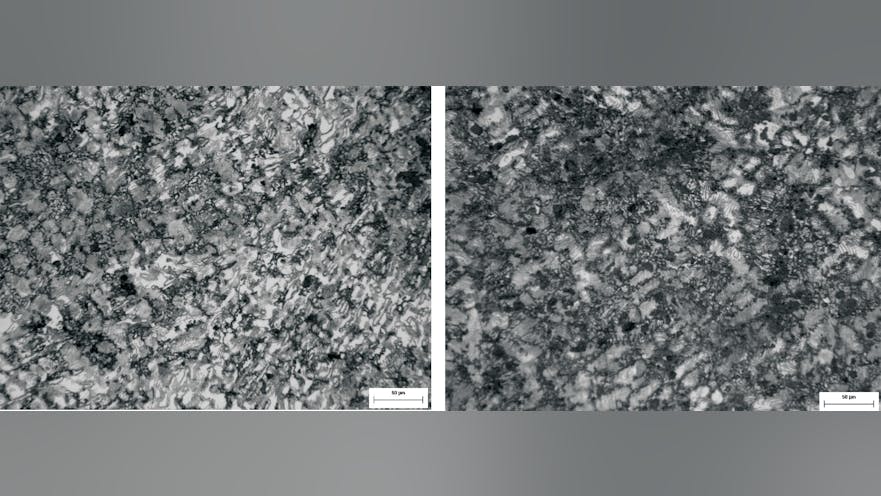Top Investment Castings of 2024
Automotive Aftermarket Foundry Books SinterCast
Could Cold Plasma Change HPDC?
Smith Foundry Chooses to Shut Down
Metalcasting involves coordinating any number of process variables in the pursuit of quality finished parts, and the resolutions to common problems in those efforts are just as variable. Gray iron foundries are frequently in need of metal additives to reduce chill and improve the tensile strength of the iron, a problem that is particularly concerning in the thin sections and corners of cast parts.
To simplify, the problem that develops in those castings results because of carbide formation during iron solidification. It’s referred to as “chill,” the result of the iron cooling and solidifying too quickly, before the desired structural density is achieved. Iron carbides reduce the tensile strength of the gray iron material, and so the foundries’ standard process solution is to inhibit carbide formation by “inoculation” — adding alloys of calcium and aluminum. Aluminum, specifically, enhances the “nucleation” process in gray iron, meaning the development of graphite crystals in the cast structure, making those products effectively more “machinable.”
The question for any gray iron foundry is how much aluminum inoculant to use to improve their results. Elkem Foundry Products is offering a new answer that may alter some metalcasters’ approach to their process variables.
Elkem recently introduced a high-aluminum inoculant that maximizes chill reduction and increases the tensile strength of gray-iron castings. This new alloy also reduces the amount of slag formed during inoculation, reducing slag build-up and the possibility of casting defects at foundries using pouring systems.
Superseed® Extra Al Inoculant contains a special formulation of aluminum, strontium, and zirconium that, the developer noted, “essentially eliminates chilled white iron in thin sections and corners, increasing the machinability of gray-iron castings.”
While the common understanding among gray iron metalcasters is that aluminum inoculation should be in the 0.005-0.010% range, in this new formula “the extra aluminum allows foundries to use a single alloy to increase the aluminum content of iron to more than 0.010%, a level that helps eliminate chill,” Elkem continued.
Also, according to Elkem, the strontium and zirconium contents of Superseed® Extra Al Inoculant help to reduce chill and enhance the gray iron’s material strength.
Notably, the chill-reducing effect is achieved without relying on calcium, as in customary inoculation practices. Being low in calcium, inoculation results in very little slag generation. Thus, less slag is transferred from the furnace to ladles or other pouring equipment, and this increases the service life of refractories used in those devices.
And, Elkem continued, the particular combination of elements in Superseed® Extra Al Inoculant lengthens the time needed for inoculation to fade after the additions are made.
“We developed Superseed® Extra Al Inoculant in response to a gray-iron customer who asked us for an alloy that maximizes chill reduction without building up slag in the pouring ladle,” stated Matthew Liptak, the Elkem sales manager who invented the alloy and has applied for a patent. “In extensive laboratory and field trials, we found that the alloy’s higher aluminum content, together with controlled strontium, zirconium, and calcium levels, achieved these goals better than existing inoculants.”
Elkem’s R&D center in Kristiansand, Norway, conducted extensive tests of different inoculants in laboratory iron, and Superseed® Extra Al Inoculant reportedly produced substantially greater chill reduction than either low-aluminum inoculants containing only strontium and zirconium, or aluminum-bearing alloys without strontium and zirconium.
“By increasing the aluminum content of iron to over 0.010% in the presence of strontium and zirconium, we achieved the optimal nucleation that is needed to eliminate the hard carbides that reduce machinability,” explained Cathrine Hartung, Elkem’s R&D engineer who conducted the tests at Kristiansand.
“In addition, we found that Superseed® Extra Al Inoculant gave higher tensile strengths in gray-iron castings than the other alloys we tested,” Hartung added.
Superior chill reduction was also obtained when Superseed® Extra Al Inoculant was tested in production foundries and compared to other inoculants. Long-term use of Superseed® Extra Al Inoculant produced less slag build-up in the pouring box compared to the other practices, reducing the risk of slag defects in the finished casting.
